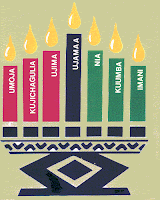In The Fear of a Black President, (Atlantic magazine, September, 2012) Ta-Nehisi Coates refers to the pressure on Obama to be "twice as good and half as Black." We can be sure we are not living in a post-racial, post-class or post-anything society as long as entry and advancing in the club require that certain identities be downplayed or covered, along with the injustices associated with them. Cautious has often been used in the liberal media to describe Obama. Bill Maher, who supported Obama's campaign, lamented repeatedly that Obama gave way or accommodated as opposed to playing hardball or taking a firm position. I found myself thinking of how African descendants were taught to be careful, cautious, in order to survive, and above all else, to avoid making the empowered feel nervous about keeping their power, or the righteousness of it. I had hoped that Obama's leadership would include a challenge to this continuing demand, and that he would use his Harvard education, biracial, and Presidency credentials to help this nation go further in facing the legacy of race.
But my disappointment does not muddy the many things I admire about Obama. They are inspiring, poignant and offer redress.
- He had the vision and the boldness to run for President.
- He spent time doing community organizing in Chicago.
- His initial speech on race following the brouhaha about his association with Rev. Wright.
- He chose and was chosen by Michelle as a spouse.
- He is able to speak about mistakes he's made.
- He has been willing to acknowledge in certain contexts that the U.S. has supported dictators.
- He instituted for a period of time a reduced cost for COBRA benefits for the unemployed.
- He appointed two women to the Supreme Court.
- The way he holds Michelle's hand and puts his arm around her.
- He brought his family to Ghana and visited Elmina Castle, the first site of imprisonment of enslaved Africans.
- Obamacare - preventing insurance companies from denying coverage to those with preexisting conditions, making health insurance possible for all.
- The love he shows his daughters, the way he speaks of them
- His writing in Dreams of my Father
- His allowing tears to stream down his face
- His intellect
- The way he uses humor at times to deal with the madness of others
- His 2008 campaign was so well organized and strategic that he won, allowing my mom, who grew up in the segregated South, to witness this country elect a Black President before she died








